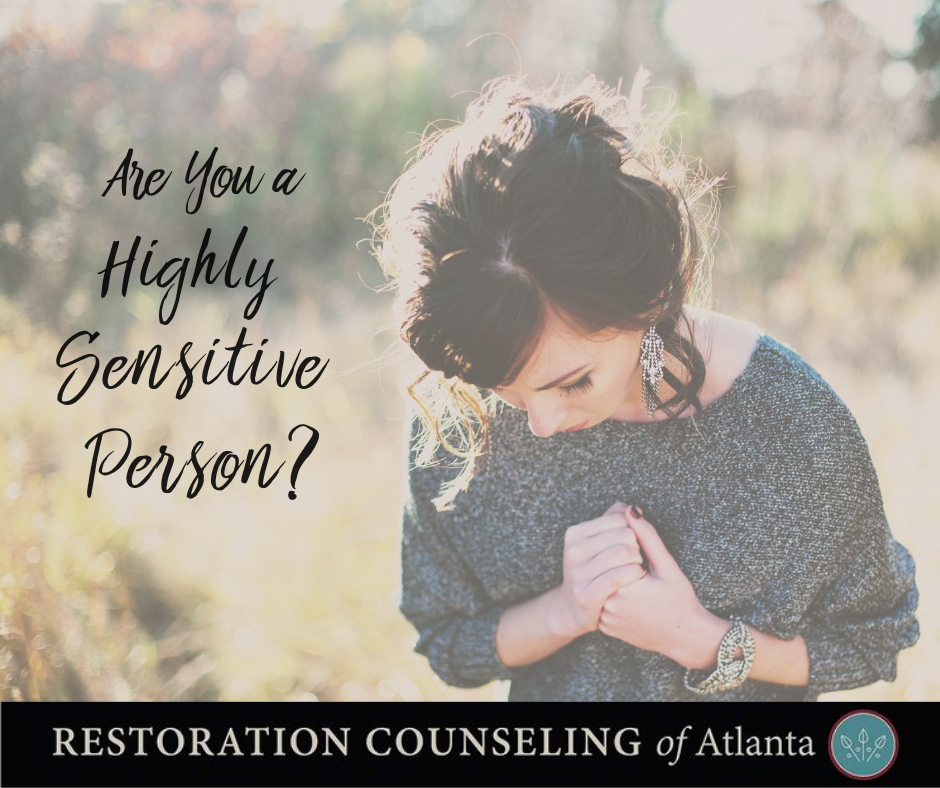Here’s How to Help Yourself.
Are you familiar with the term Highly Sensitive Person (HSP)? Maybe you’ve realized recently that you are an HSP. Perhaps you have a friend or family member that has used this term to describe themselves. Maybe you’ve never heard of it but resonate with the idea of it. Being highly sensitive is a trait that has been researched and coined by Dr. Elaine Aron. In short, a highly sensitive person tends to process deeply and have a stronger nervous system reaction to external physical, emotional, and social stimuli. You can also get a quick overview from our blog article by Jennifer Stuckert. If you are wondering if you are highly sensitive, you can take the HSP test on Elaine Aron’s website.
Know That You’re Not Alone
Being an HSP myself, knowing HSPs, and having worked with many clients who are HSPs, I can tell you that there are many different reactions to learning that you have the HSP trait. Some feel relieved to know that they are not the only ones. Others want to know how they can de-sensitize themselves (you can’t). Some are unsure about what to do with this information. Regardless of your initial reaction, the next question is “What do I do with this information?” If you’re not sure what to do as a Highly Sensitive Person, I have some next steps for you.
Recognize What You are Feeling
To begin, you will need to look inward to identify some personal feelings and sensations. Taking care of yourself is important for every person, but it is a matter of functionality for HSPs. Here are a few things to identify if you are an HSP:
-
Identify your feelings about being an HSP.
Like I said above, there are many different reactions to finding out that you are an HSP. Ask yourself “How do I feel about being an HSP? Do I like it? Do I wish I wasn’t one?” If it’s easy for you to embrace being an HSP, that’s great! If you find yourself wishing you were not one, you may need to work on accepting this part of you.
-
Identify any external messages you got about being sensitive.
Being sensitive is not generally seen as a positive trait by our society. How often were you told you were being “too sensitive” when you were growing up? Ask yourself what you have been told about sensitivity. Are there any messages that you may have internalized?
-
Identify signs in yourself that you are overwhelmed.
As an HSP, you may be overwhelmed easily and quickly by external stimuli such as lights, sounds, social activity, and stress. Because of this, HSPs will need to check in with themselves often to catch feelings of distress before the overwhelm sets in. Some physical sensations may include foggy thinking, shortness of breath, or shakiness. You may also notice a shift in your thoughts such as a decrease in self-esteem.
Helpful Tips to Flourish
Identifying your feelings and thoughts about being an HSP is a great first step. Next, you’ll want to ensure you are caring for yourself in a way that lets you flourish as an HSP. Below are a few quick tips that are particularly helpful for HSPs as they learn to care for themselves.
- Ensure you are getting daily downtime. Because HSPs tend to process deeply, we need time to sort through our thoughts. We also need downtime from all the external stimuli.
- But not too much downtime. Sometimes it can feel easier to stay in and become a homebody because of the overstimulation HSPs feel so easily. However, the more you avoid any stimulation, the more sensitive you will become because you do not ever learn how to deal with it. You will have to find a balance between time out and time in.
- Get enough sleep. Elaine Aron recommends 9 hours of rest… which means sleep or at least time in bed with your eyes closed. Much stimulation is brought in through the eyes, and even resting with your eyes closed gives you a break from the stimulation.
- Get out into nature. Studies have shown that being in nature can lower your heart rate and blood pressure. For HSPs who already have a heightened nervous system, external resources for decreasing stress and overstimulation are crucial.
- Learn to set boundaries. Because HSPs require more downtime, boundaries will be important for ensuring you get downtime.
- Tell the people closest to you about your sensitivity. It can be hard to understand being an HSP when you are not one. If your spouse, family, or friends aren’t HSPs, they may not understand why you need extra downtime or your reaction to overstimulation. It is understandable that you may feel cautious about who you tell because of potential reactions. Tell the people you feel most safe with.
We Can Help
These tips are simply a starting point. Every Highly Sensitive Person is different and will require different care. As Socrates says, “To know thyself is the beginning of wisdom.” Knowing yourself will allow you to best care for yourself and thrive in the world. If you are an HSP, not sure how to manage it, and would like the help of a therapist, please don’t hesitate to reach out to me at ashley@restorationcounselingatl.com!
 Written by Ashley Skinner, MA, APC
Written by Ashley Skinner, MA, APC
Woodstock Location
ashley@restorationcounselingatl.com ext 119
Ashley takes a multi-theory approach to psychotherapy. This allows her to take the whole person into account – mind, body, and soul. Her emphasis is on Cognitive-Behavioral Therapy, Narrative Therapy, and mindfulness techniques. She works with individuals ages 18 and up, dealing with anxiety and/or depression, postpartum anxiety and/or depression, trauma, abuse, life transitions, self-esteem issues, and grief.

